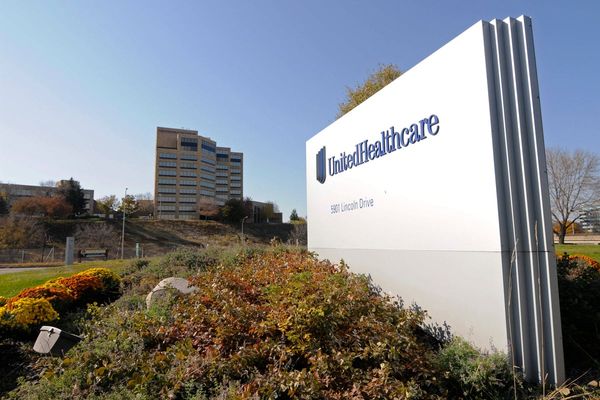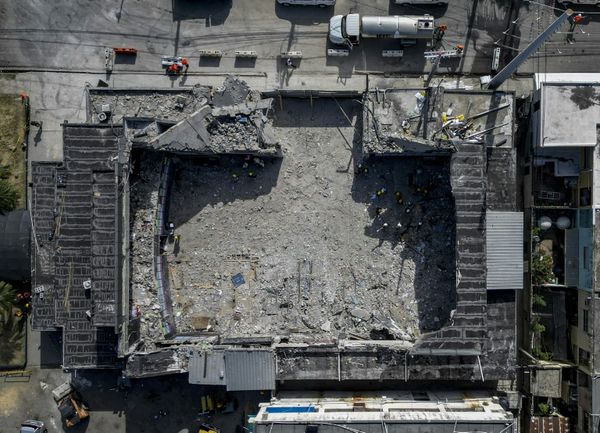No-one likes paying tax.
Australians tend to agree with the sentiments of Kerry Packer, the media mogul who told a parliamentary committee decades ago that anyone who doesn't minimise their tax "wants their head read".
But there's a growing sense of urgency to discussions around Australia's tax problems.
Put simply, the government isn't pulling in enough tax to fund the basic services Australians expect. And that imbalance is only forecast to grow in the years ahead.
The public rightly expects health care, the NDIS, defence and aged care to be properly funded, but all four areas are rapidly growing in cost.
And there are persuasive arguments to spend more money in a whole range of areas — lifting the JobSeeker rate, for example.
Massive adjustments are going to be needed just to ensure the federal government's revenues are growing at the same pace as its spending.
But the Albanese government has made a clear commitment to only the most modest of tax changes throughout this term of government.
Next week's budget might contain a few tweaks, but broad-ranging reforms are very unlikely.
A number of experts argue that at some point soon, something is going to have to give.
Warnings from decades past
The budget has some big problems, but unlike other challenges (overseas wars, a global pandemic) this one was seen coming.
In 2002 the first "Intergenerational Report" was published, looking at how the government was going to fund itself for decades ahead.
It warned that "the current generation of taxpayers is likely to impose a higher tax burden on the next generation".
And it suggested that "future governments will need to make the difficult decisions that ensure future generations of Australians continue to enjoy a stable and resilient economy".
It essentially painted a picture of an ageing population, relying more on the government to fund increased healthcare, aged care and pension costs.
Government spending was guaranteed to climb, and not enough revenue was going to be brought in to pay for it. The budget was bound for what it's facing now — a "structural deficit".
It set up a clear choice for future governments: reduce spending, raise more revenue, or both.
Ken Henry was the Treasury secretary at the time that report was published and said those warnings have not really been heeded.
While some tax reform has been attempted, and some achieved, he argues it falls short.
"The Australian political system has not been in a good place to carry the sort of serious discussion about tax reform that we need," he said.
But he is optimistic change might finally be possible.
"I do think that things are changing. I do think that people are beginning to understand that we've gotten ourselves into a hell of a mess."
A huge tax imbalance
There are two big problems with an ageing Australian population.
The first is the most obvious. The cost of providing quality care for more and more older Australians is going to climb, and there are going to be proportionally fewer working-age Australians to generate the revenue needed to pay for it.
The second is a somewhat self-inflicted structural problem.
The federal government pulls in revenue from all sorts of places. Income tax, GST and company tax are the three big ones.
But income tax is by far the biggest slice of that pie.
In the most recent budget, Australian workers contributed 45 per cent of all the revenue collected.
Australian companies contributed less than half of what workers did, 21 per cent, including the taxes gas companies pay to sell Australian gas abroad.
And the fastest-growing part of the revenue pie is income tax.
Independent MP Allegra Spender has made tax reform a personal mission since arriving in parliament last year.
She said the income tax challenge is pretty clear, but is being met with frustratingly little urgency.
"Twenty years ago, we had six and a half people who were working for every person who wasn't working," she said.
"At the moment, we've got about four people who are working for every person who isn't working. In 20 years time, we're going to have around two and a half people who are working for every person who's not working.
"So we can't just completely rely on these workers to continue to bail the rest of the country out."
Where to find more tax?
Mr Henry argues there are two key problems with how Australia collects tax.
The first is how much tax the government brings in, and the second is where it takes it from.
He argues it's time to do away with a self-imposed rule successive Coalition governments have placed on themselves, effectively capping the total tax take at 23.9 per cent of GDP.
The current Labor government has been careful not to adopt the arbitrary cap as a concrete rule, but also doesn't intend to hit it.
Mr Henry said it is no longer feasible to try and stay under it.
"Having traversed the past 20 years, we now know that the tax-to-GDP ratio is going to have to increase," he said.
"And it's going to have to increase very substantially."
The second problem is what he sees as an over-reliance on income tax.
He argues successive governments have relied too much on "bracket creep", which is basically average Australian wages climbing and pushing more and more people into higher tax brackets, and increasing revenue.
Mr Henry said it is time to look beyond the wallets of ordinary Australians for income — and he, along with many others, has a few targets in mind.
Diesel, gas and the GST
Australian gas exporters have had a sensational few years, as global demand has soared and pushed prices to record highs.
Some of that revenue is flowing through to the budget — with some economic forecasters suggesting gas, coal and iron ore revenues could tip the budget back into an unexpected surplus.
But a range of politicians, lobby groups and tax experts argue the government should be capturing much more, particularly from gas exporters.
The Grattan Institute's Kate Griffiths is among those suggesting changes to the "petroleum resources rent tax" (PRRT), arguing a simple tweak to how gas is priced for tax purposes could deliver the budget billions in extra revenue.
"One of the big opportunities on the table is to just look at how gas is priced under the PRRT," she said.
"There's a much sort of simpler, cleaner, more transparent way to price gas that would raise a bit more revenue, and that's what we're recommending.
"It would be worth about $3-4 billion a year."
This is one change that is actually a serious possibility, as soon as the budget is handed down next week — with the treasurer, Jim Chalmers, having indicated he's very open to change in this area.
A much bolder reform suggested by the Grattan Institute is the size and shape of the GST.
It wants to see the government lift the GST to 15 per cent and broaden the base, while using some of the additional revenue to compensate lower-income households.
If revenue was split 50-50 between the states, the change would raise around $6 billion each year in revenue.
And it suggests unpicking a Morrison-government deal done with resource-rich Western Australia, guaranteeing it receives back at least 70c in every dollar that the state pays in GST.
Every other state and territory is currently compensated by the Commonwealth to ensure they're not worse off, which currently costs about $5 billion every year.
Ms Griffiths said it's a politically tricky, but financially unsustainable, deal.
"Can the federal budget really afford to be propping up the only state that has good finances, a really strong budget position, in Western Australia with an extra $5 billion a year?" she said.
"We say this would be a really easy win, maybe not politically, but an easy way to reduce the structural budget problem."
Ms Spender has pointed to fuel tax credits as another simple area for reform.
Heavy on-road vehicles currently pay a discounted rate of fuel excise, while off-road vehicles driven by mining companies and farmers pay none at all — on the grounds they shouldn't be paying for roads and infrastructure they don't drive on.
Ms Spender said it is time those credits are wound back, while the government considers how to replace fuel tax revenue as more electric vehicles take to the road.
"I've been really pushing on the government to consider those fuel tax credits it gives to big carbon-emitting companies — why should they have fuel tax credits so that they can get cheap diesel and pollute the country?" she said.
"I think that's something that government can do in the short term, but needs to fix also in the long term."
Super profits and superannuation
Mr Henry has bigger targets, and broader changes, in mind.
He argues the system needs to be broadly restructured to better target those people and companies accruing significant wealth but paying little tax on it.
He points out that those doing the best — whether it be a home owner who has seen the value of their property skyrocket, or a mining company posting a huge profit — often pay little or no tax on their windfall.
"Capital gains, windfall gains, super profits in Australia are taxed incredibly lightly. It's almost as if they're sacrosanct," he said.
"As if those who, just through pure luck or good fortune, ended up with a windfall gain or a super profit, well, good on them, we shouldn't tax that.
"But of course, that's one of the things we should be taxing much more heavily than we do."
And Mr Henry argues relying more heavily on consumption taxes — like the GST — would help ensure older, wealthier Australians are still contributing taxes, rather than relying on taxing the incomes of younger working Australians.
He said many older Australians have generated huge wealth through various tax breaks on property and superannuation and could be contributing more.
"The budget is going to have to be financed by young working Australians who are facing increases every year on the average rate of tax applying to their labour income, who have no realistic prospect of affording a house of their own," he said.
"Probably paying off HECS debt, burdened with a trillion dollars or more of public debt, burdened with having to address the increasing costs of climate change.
"We're saying to them, well, don't expect us to tax the consumption of older Australians, because that would be unfair, much better that they remain tax-free. And that's equitable?"
What about the stage 3 tax cuts?
The stage 3 tax cuts have become an economic punching bag, and at times a proposed silver bullet for anyone with an expensive proposal looking for a way to pay for it.
The tax cuts do two things — firstly, they lower the tax rate for workers earning more than $45,000, while increasing the top tax bracket from $180,000 to $200,000.
They also abolish an entire tax bracket. The second-highest bracket, currently targeting workers earning between $120,000 and $180,000, would be abolished.
That means under the changes, every dollar earned between $45,000 and $200,000 would face the same 30c tax rate.
Overall, everyone earning more than $45,000 will receive a tax cut, with the bulk of the benefits flowing to middle- and higher-income earners.
There are plenty of calls to scrap the tax cuts, and bank the $243 billion or so that would otherwise be foregone over a decade.
But others argue there are good reasons to stick to at least some, if not all of the plan.
One primary purpose of the tax cuts is to address "bracket creep" and give back some of the additional tax that Australians are paying because their wages have climbed — often slower than inflation.
Ms Griffiths from the Grattan Institute says that's a worthwhile aim.
"There is some justification for tax cuts, and that justification is that over time, bracket creep has been pushing average tax rates up for middle-income earners particularly," she said.
"And so stage 3 gives back some of that."
The Grattan Institute says the tax cuts should be redesigned, rather than scrapped.
It suggests keeping the changes to the lowest and highest income brackets, but retaining the 37c tax bracket — arguing almost all taxpayers would still benefit, but the gains for the highest-income earners would be softened.
That change would save $8 billion in the first year, and grow from there.
Mr Henry argues the whole package is worth keeping.
He said the changes are an important step towards restructuring the budget away from relying on income tax, and a simple matter of fairness.
"All it does — and it doesn't even quite achieve this — is hand back the fiscal proceeds of bracket creep," he said.
"Handing back the fiscal proceeds of bracket creep is the very minimum that has to be done in restructuring the Australian taxation system.
"We have to learn to place less reliance on personal income tax as a source of revenue and more reliance on the more robust, less economically damaging and fairer tax bases."
Next week's budget will lay these problems out in stark detail — the question is what might be in there to address them.







